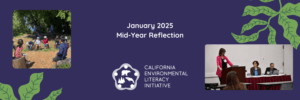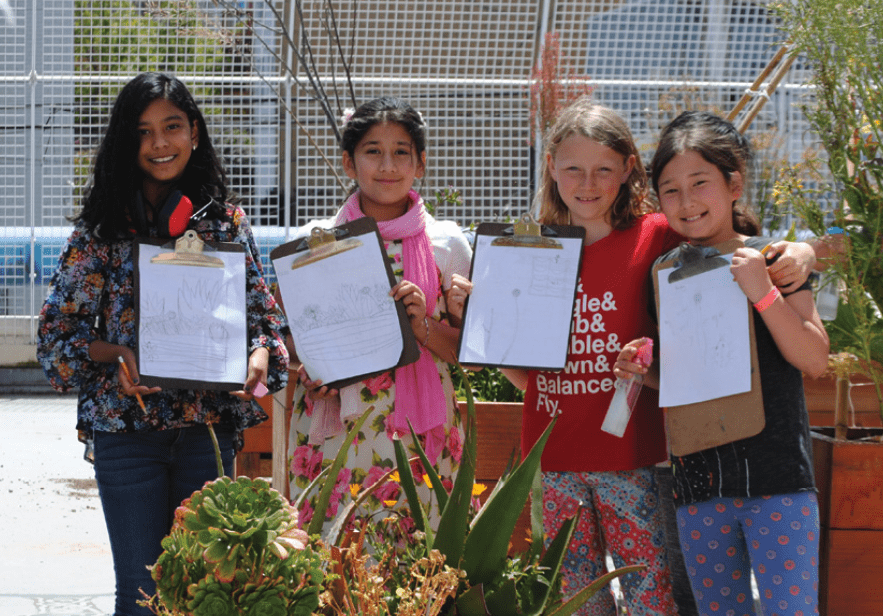In November, CAELI’s District Innovation Hub convened in Pasadena for its fourth annual meet-up at the Green California Schools and Higher Education Summit (GCSHE). This event brings together education leaders from across the state who have similar goals to incorporate environmental action and climate literacy into their campus, curriculum, community, and culture.
Organized by District Innovation Hub co-leads Tim Baird and Gloria Harwood, this year’s meet-up featured a robust agenda, including a pre-conference workshop and dinner, as well as a networking breakfast and lunch at the summit. The District Innovation Hub also coordinated several workshops led by CAELI members and associated partners. The meet-up’s overarching goal was to share best practices in sustainability initiatives, encourage strategic planning, and strengthen relationships between district representatives and the county and community based partners who support them. Similar to last year’s meet-up, the intention is to support CAELI’s broader mission to increase equitable access to environmental literacy.
This year’s meet-up continued to establish this event as an important annual tradition and flagship event for achieving the mission of the hub. “With increased attendance and variety in sessions, this year’s District Innovation Hub meet-up and Green California Schools and Higher Education Summit was the most impactful so far,” noted Tim Baird. “Plans are underway to increase the meet-up to a full day before the Summit begins. The District Hub hopes to see all CAELI members at next year’s meet-up!”
Pre-Conference Highlights
CAELI members joined pre-conference sessions including: the Superintendent of San Diego County’s National School District, who gave an overview of how students in her district are incorporating the UN Sustainability Development Goals (SDGs) around school; a great discussion on how to ensure the continuation of environmental initiatives following the departure of a district leader; and a conversation on recruiting a balance of District Innovation Hub members representing the variety and diversity of districts throughout California, including how the hub can continue to support capacity building efforts across the state through the upcoming District Innovation Hub Webinar Series. These were just some of the many innovative ideas shared from district representatives at the pre-conference session.
The Hub then joined other CAELI members for further networking opportunities over dinner. Gloria Harwood shared that the dinner portion of the meet-up was, “particularly memorable, fostering new connections and strengthening partnerships within the District Innovation Hub. Building relationships through a shared commitment to environmental literacy always energizes me, and this year was no exception.”
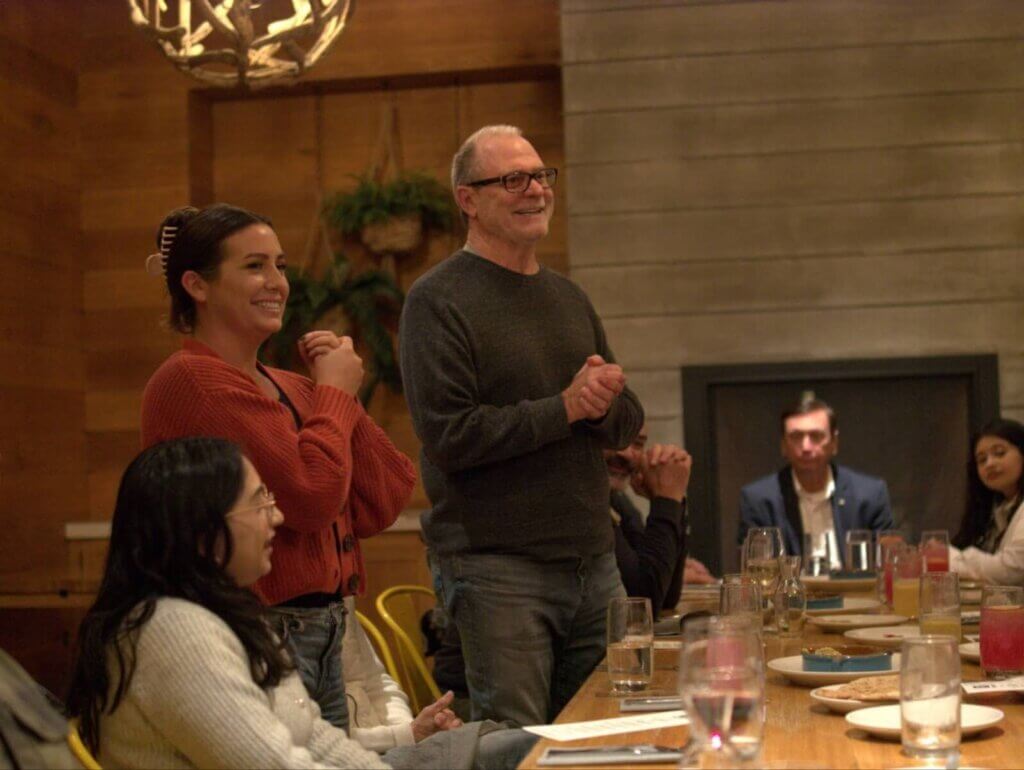
Key Sessions and Highlights at the Conference
CAELI was heavily represented at the Summit’s Education Program, making up forty percent of the sessions. This allowed for expanded opportunities to share best practices in sustainability and environmental literacy.
Ed Hilton, chief technology officer of Tahoe-Truckee Unified School District, a new member of the District Innovation Hub, presented his district’s plan to develop a student learning lab and outdoor school facility. After attending other sessions, Ed reflected positively that he benefited from the collaborative focus of the sessions and meet-up and was impressed by other members’ innovative programs and experience. “I gained new insights from our district’s data on the Environmental and Climate Action Indicators and Analysis Scorecard, which support the ambitious goals we’ve set for Tahoe-Truckee Unified School District. We shared the data with our Board of Education as soon as we returned home! The conference workshops were a fantastic source of new ideas and reignited my passion for this work. Tahoe-Truckee is excited to continue collaborating with CAELI and we look forward to what we will accomplish together for all our students,” Ed said.
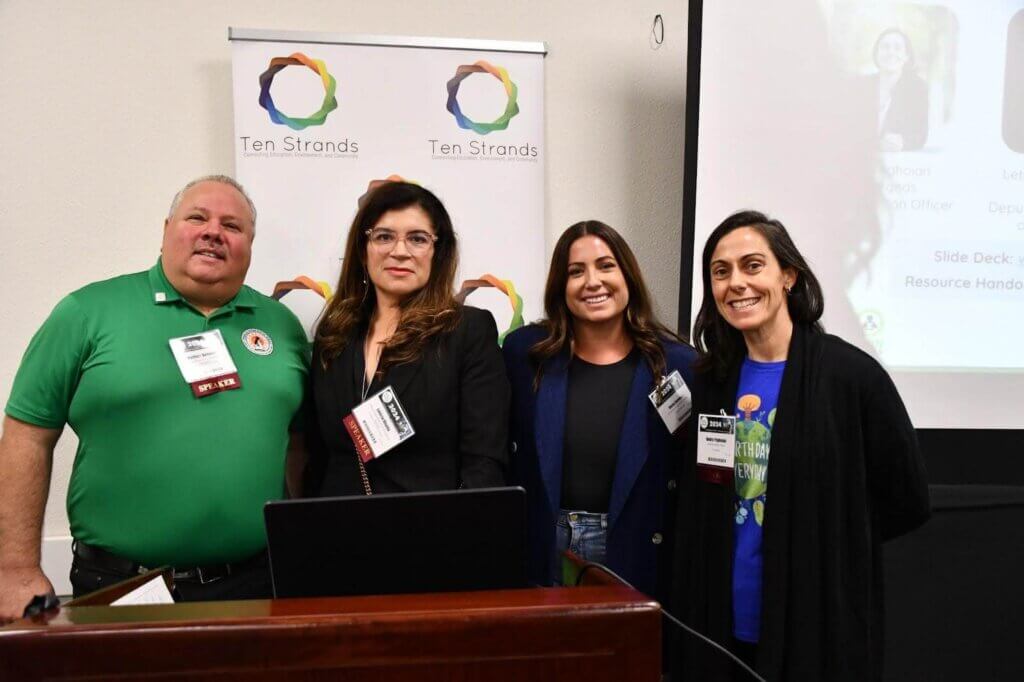
Gloria Harwood was featured in three presentations throughout the GCSHE Summit:
- First, she joined Andra Yeghoian, chief innovation officer at Ten Strands, Leticia Bhatia, deputy superintendent of educational services at Cabrillo Unified School District, and Matthew Belasco, director of maintenance, operations, and transportation at Pittsburg Unified School District for Catalyzing Environmental Action Through School Board Policy. This session explored how school board policies can drive meaningful, sustainable change, turning schools into hubs of environmental stewardship that are leveraged as a laboratory for learning.
- Gloria also collaborated with Chad Mabery, assistant superintendent of instruction at Laguna Beach Unified School District (LBUSD), for Sustainability in Action: Building a Culture of Climate Resilience in Schools. She shared LBUSD’s comprehensive roadmap for integrating sustainability across school operations and educational programming, and also presented practical approaches to greening facilities and weaving sustainability into curriculum.
- In Growing Minds, Greener Futures: Integrating SEL and Environmental Literacy through Nature-Based Learning, Gloria and LBUSD student support specialists Amelia Miscione and Megan Humphreys presented on Social and Emotional Learning (SEL). Participants learned about the positive impact these nature-based programs have on SEL, supporting student engagement and holistic development.
Tim Baird led the session Environmental Literacy – The Key to Inspired, Authentic, and Rigorous Learning. He highlighted the key components of effective learning and how this connects to teaching environmental literacy, and took participants on a learning journey, showing how a good question can lead to an investigative lesson on an environmental issue. The session emphasized that environmental literacy is a powerful tool for engaging students, enhancing academic rigor, and empowering teachers to create more effective instruction.
Stephanie Willits, recycling coordinator for Fremont Unified School District (FUSD), shared her district’s initiative to switch to reusable foodware in ten of their cafeterias. The presentation, Reusables in the Cafeteria: A School District’s Journey to Zero Waste, showcased FUSD’s challenges and triumphs, such as the positive impacts on waste, the environment, and overall nutrition. This session was inspiring for districts who are aiming to bring reusables into their district, showing them that this shift is possible and beneficial.
TreePeople led the presentation Sustainability in the Curriculum and Student Engagement. They discussed how to engage parents, teachers, administrators, and students in the green schoolyard design process. It also included the curricular components that TreePeople brings to schools that are designed to educate students about schoolyard renovation.
Students from Yosemite High School, along with CAELI’s Jeff Rivero, presented, United for Change: Collaborating Across Schools, Cities, and Government for Social and Environmental Advocacy. Lily Abarca-Morales, Jasmine Arroyo, Emma Avalos, Bre Goodman, Ebony Munoz, and Jesus Vasquez-Santos spoke about their school’s partnership with Daraja Academy in Kenya. They are helping Daraja become more sustainable by sending air quality monitors and solar battery generators to the school. The students have also spearheaded a battery recycling program, aiming to educate the public on the environmental dangers of lithium mining and improper battery disposal. This leadership is improving environmental conservation and community well-being well outside Yosemite High School’s campus.
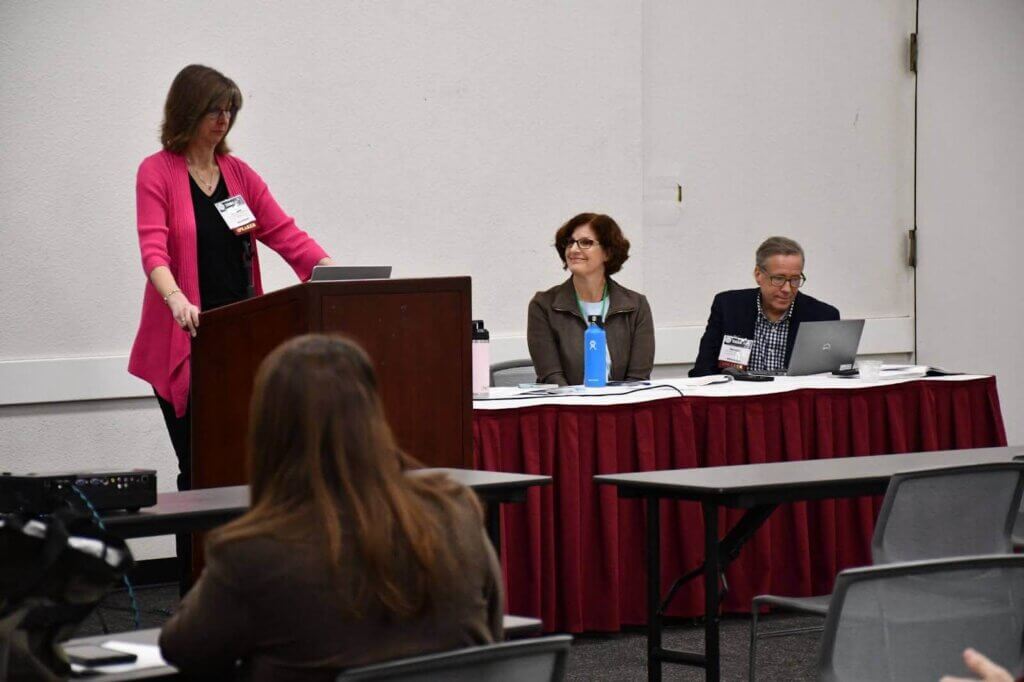
In the Interactive Workshop: Catalyzing Systemic School Facilities Upgrades through Multi-Agency Partnerships, Julie Hilborn, Susan Wright, and Ron Soper of San Mateo County Office of Education shared successful strategies for advancing sustainability in schools through multi-agency partnerships in San Mateo County. The team highlighted how local collaboration, including support from agencies like Peninsula Clean Energy, has helped districts access funding and technical resources to upgrade facilities and transition to clean energy. The session offered practical strategies for building local partnerships and using data-driven methods to enhance school facilities.
In a separate session, the San Mateo County Sustainability Department shared how their programs empower students to take action on environmental issues in the session Engage Students to Take Action to Conserve Resources, Protect the Environment, and Prepare for Climate Change. Through participating in an interactive game and hearing about hands-on lessons, attendees learned how to make learning about sustainability engaging and impactful.
At the CAELI session How Our Rain Gardens and Bioswales Build and Provide the Best Learning Environment for Our Children, speakers Marissa Cutaran-Vickers (LAUSD), Christine Flowers (California State University, Sacramento), and Cecile Carson, EdD (Keep California Beautiful) showcased how participatory science empowers students to become environmental stewards. They explained how students developed skills in maintaining bioswales and rain gardens while also preparing for future green job opportunities. Teachers explored best practices for fostering environmental awareness and implementing impactful green initiatives on their campuses, demonstrating how science for everyone can drive meaningful change in schools and communities alike.
Looking Forward: Continuing the Momentum
Erica Mertens, the energy conservation and sustainability program manager at Tahoe-Truckee Unified School District, is a new member of the District Innovation Hub and attended this year’s meet-up for the first time. She shared other CAELI members’ appreciation for the event, adding that it “provided invaluable insights, inspiration for new programs in my district, and many connections with others across the state who are doing parallel work. Already looking forward to the next!”
The future of environmental and climate education in California is full of promise, thanks to the ongoing efforts of the CAELI network. The annual District Innovation Hub meet-up plays a key role, uniting leaders to share best practices and inspire action. Stay engaged with CAELI and the District Innovation Hub for opportunities to shape a more sustainable, resilient future and empower the next generation to tackle climate challenges.





